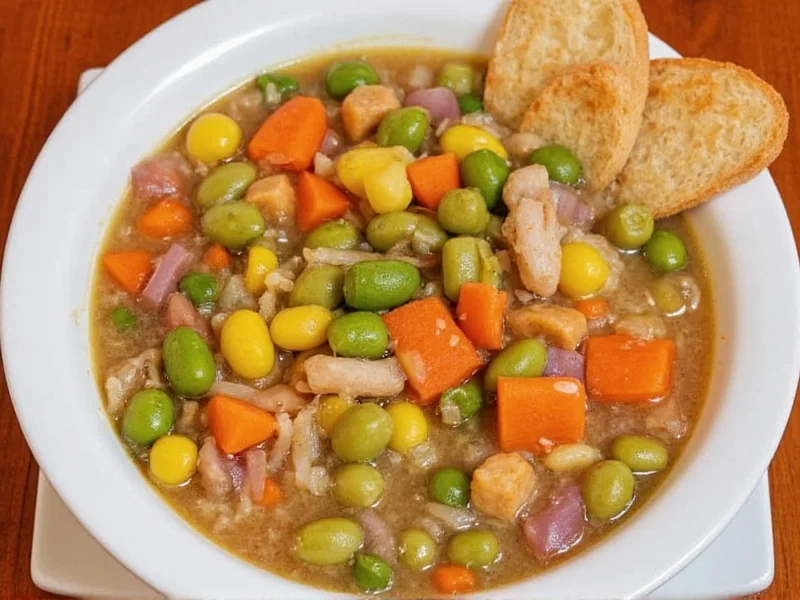Slow cooker soups represent one of the most practical approaches to home cooking, delivering restaurant-quality results with minimal effort. Unlike traditional soup methods requiring constant attention, these recipes leverage low, steady heat to break down tough cuts of meat and meld flavors over time. The magic happens while you're at work or asleep, making it ideal for meal preppers and time-pressed households.
The Science Behind Superior Slow Cooker Soups
Understanding the thermal dynamics of slow cooking explains why these soups develop such complex flavors. At temperatures between 170-280°F (77-138°C), collagen in meats gradually converts to gelatin without toughening proteins—a process impossible with rapid boiling. This gentle extraction creates naturally thickened broths rich in amino acids. Vegetables maintain structural integrity while releasing sugars slowly, preventing bitterness common in rushed preparations.
Essential Equipment Checklist
While any slow cooker works, optimal results come from:
- 6-7 quart capacity (accommodates proper ingredient ratios)
- programmable timer with warming function
- removable ceramic insert for even heating
- glass lid for moisture control monitoring
| Soup Type | Minimum Cooking Time | Optimal Temperature | Key Flavor Development Stage |
|---|---|---|---|
| Chicken-based | 4 hours | Low (190°F) | 3-4 hours (collagen conversion) |
| Beef stew | 8 hours | Low (190°F) | 6-7 hours (connective tissue breakdown) |
| Vegetable | 3 hours | High (200°F) | 2 hours (sugar caramelization) |
| Bean and legume | 6 hours | Low (190°F) | 4-5 hours (starch gelatinization) |
Mastering Slow Cooker Soup Techniques
Browning meats before adding creates foundational flavors through Maillard reactions—never skip this step for meat-based soups. Layer ingredients strategically: dense vegetables like carrots at the bottom, proteins in the middle, and delicate greens on top. Add dairy or acid (tomatoes, vinegar) during the last 30 minutes to prevent curdling or bitterness.
For best slow cooker soup recipes that avoid common pitfalls, remember these professional tips:
- Reduce liquid by 25% compared to stovetop recipes (minimal evaporation occurs)
- Halve potatoes and dense vegetables to ensure even cooking
- Stir in fresh herbs after cooking to preserve volatile oils
- Skim fat during the last hour for clearer broth
Five Foundation Recipes for Every Season
These versatile templates adapt to seasonal ingredients while maintaining perfect texture and flavor balance:
1. Universal Vegetable Soup Base
This healthy slow cooker soup forms the backbone for endless variations. Combine 8 cups broth, 2 chopped onions, 4 minced garlic cloves, 3 diced carrots, 3 diced celery stalks, 1 diced fennel bulb, 2 cups chopped seasonal vegetables, 1 (14oz) can diced tomatoes, 2 bay leaves, and 1 tbsp Italian herbs. Cook on low 6 hours. Stir in 1 cup fresh spinach and 2 tbsp lemon juice before serving.
2. Bone Broth Chicken Noodle
Using roasted chicken bones creates superior depth. Add 8 cups water, 2 lbs roasted bones, 1 onion (quartered), 2 carrots (chopped), 3 celery stalks (chopped), 4 garlic cloves, 2 tbsp apple cider vinegar, and 1 tsp black peppercorns. Cook on low 12 hours. Strain, then return 6 cups broth to cooker with 2 cups shredded chicken, 2 cups egg noodles, and 1 cup peas. Cook 1 hour more.
3. Rustic Beef and Barley Stew
For this hearty slow cooker soup, brown 2 lbs stew meat in batches. Add to cooker with 4 cups beef broth, 1 cup red wine, 2 onions (chopped), 3 carrots (sliced), 2 parsnips (diced), 1 cup pearl barley, 3 garlic cloves (minced), 2 tbsp tomato paste, and 1 sprig rosemary. Cook on low 8 hours. Remove rosemary before serving.
4. Smoky Black Bean Soup
An excellent vegetarian slow cooker soup option. Combine 3 (15oz) cans black beans (rinsed), 4 cups vegetable broth, 1 onion (diced), 1 red bell pepper (diced), 3 garlic cloves (minced), 1 jalapeño (seeded), 2 tsp cumin, 1 tsp smoked paprika, and 1 bay leaf. Cook on low 6 hours. Stir in 2 tbsp lime juice and 1/4 cup cilantro before serving.
5. Creamy Tomato Basil
For the best slow cooker tomato soup, combine 2 (28oz) cans crushed tomatoes, 1 onion (diced), 4 garlic cloves, 1 cup vegetable broth, 2 tbsp balsamic vinegar, 1 tsp sugar, and 1/4 cup fresh basil. Cook on low 4 hours. Blend until smooth, then stir in 1/2 cup heavy cream (optional).
Advanced Flavor Development Strategies
Professional chefs use these flavor-boosting techniques in their slow cooker soup recipes:
- Umami layering: Combine multiple umami sources like tomato paste, soy sauce, and dried mushrooms
- Acid balancing: Add citrus or vinegar at the end to brighten flavors
- Fat infusion: Stir in herb-infused olive oil before serving
- Texture contrast: Reserve some vegetables for last-hour addition
For easy slow cooker soup for beginners, start with the vegetable base recipe, which forgives timing variations. As your confidence grows, experiment with protein combinations and international flavor profiles. Remember that slow cooker soups often taste better the next day as flavors continue melding during refrigeration.
Troubleshooting Common Issues
Watery soup? Remove lid during last hour to reduce liquid. Bland flavor? Stir in 1 tbsp miso paste or fish sauce. Vegetables mushy? Cut larger and add during last 2 hours. Too salty? Add raw potato chunks to absorb excess salt, then remove before serving. These slow cooker soup tips and tricks solve most problems without starting over.
Final Thoughts on Perfect Slow Cooker Soups
Mastering slow cooker soups transforms weeknight cooking from a chore into an opportunity for culinary creativity. These time-saving slow cooker meals deliver consistent results while requiring minimal active time—ideal for modern lifestyles. By understanding the science behind the process and implementing these flavor-enhancing techniques, you'll create soups with depth and complexity that rival professional kitchens. The true beauty lies in their adaptability: adjust ingredients based on seasonal availability or dietary needs without compromising results. Start with the foundational recipes, then experiment with global spices and specialty ingredients as your confidence grows.











 浙公网安备
33010002000092号
浙公网安备
33010002000092号 浙B2-20120091-4
浙B2-20120091-4